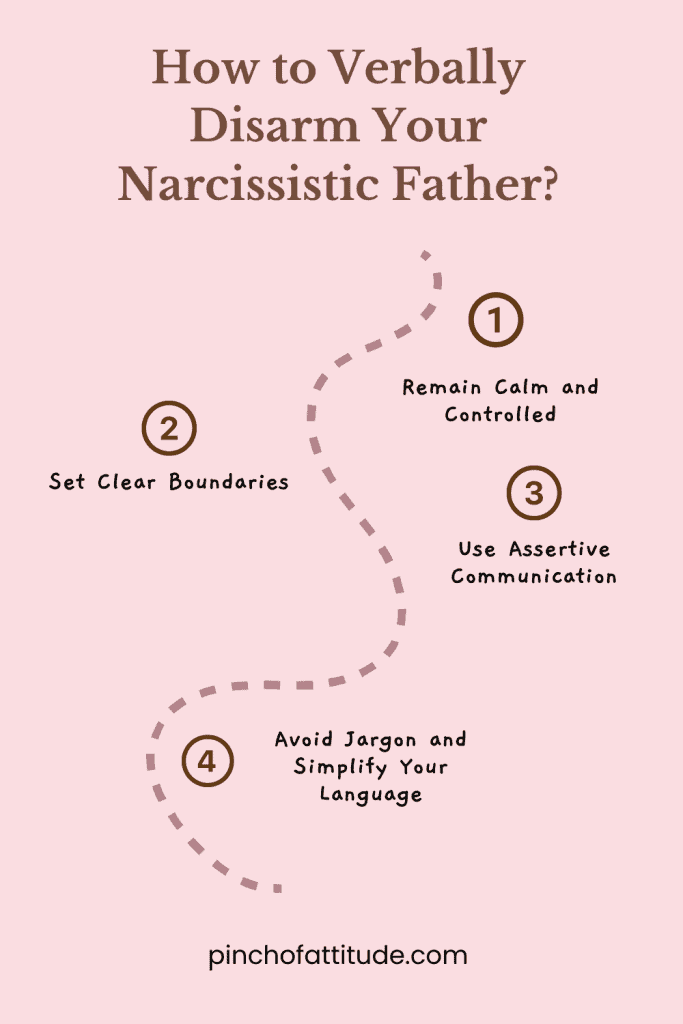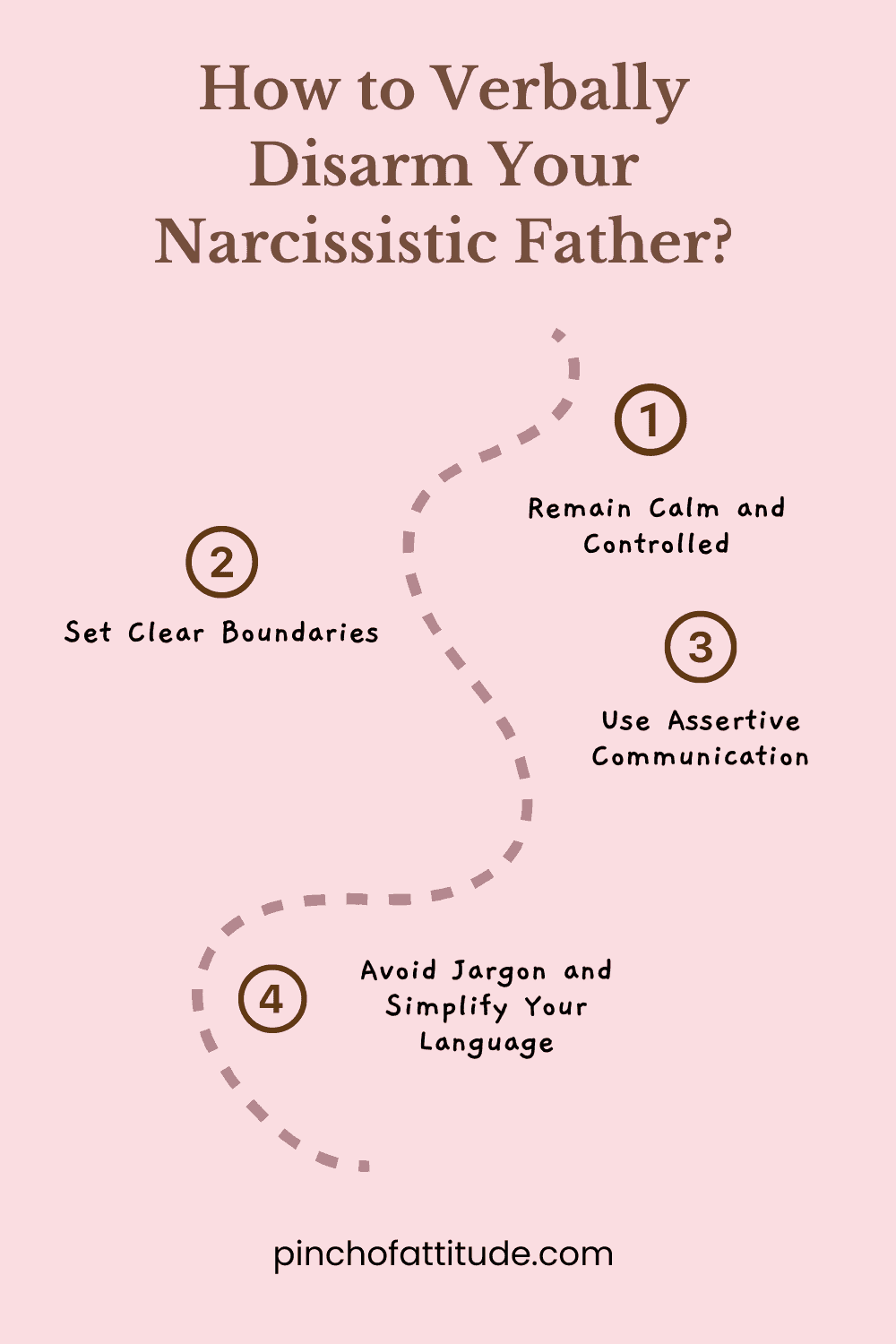Is your dad’s vocabulary stuck on “disappointment” and “failure”? Maybe he’s fluent in guilt trips and backhanded compliments?
If so, you’re likely dealing with a narcissistic parent. The things narcissistic fathers say aren’t just head-scratchers. They’re weapons.
But the real question is, why do they say it?
And more importantly, how do we, the children of these emotional Olympians, verbally disarm them without getting sucked into the drama?
- Your narcissistic dad’s words hurt, but they are not your truth. Believe in your worth, even if he can’t.
- You don’t have to play his game. Disarm his barbs with calm, clear boundaries. Focus on facts, not his manipulations.
- Healing is possible. Seek support from loved ones or a therapist. Prioritize self-care and rebuild your self-esteem.
Table of Contents
30 Things Narcissistic Fathers Say to Their Children

Growing up with a father whose words could’ve come straight out of a villain origin story is no easy feat.
If you’re wondering if your dad is the same, here are common phrases narcissistic dads say that will make you want to crawl under the covers and hibernate:
- I sacrificed so much for you. A narcissistic father may say things like, “I gave up my dreams for you!” and other manipulative lines to turn genuine parental support into a bargaining chip. The goal? To make you feel obligated to fulfill his every wish to “repay” him.
- Try harder if you want to impress me. Raised by a narcissistic father, you could win the spelling bee and get a “good, but could’ve been perfect.” It’s a never-ending game of “not good enough,” designed to keep you chasing their ever-shifting standard of approval.
- Why can’t you be more like (sibling/friend)? Narcissistic parents love holding up someone else’s accomplishments as a mirror to your perceived flaws. These comparisons aren’t about your potential. They’re about feeding their own need for validation through a child who reflects their desired image.
- You’re lucky to have a father like me. Let’s be real. Did you win the lottery because your dad decided to grace you with his presence? Nope. In truth, it’s not you who’s lucky. It’s them who gets to bask in the warm glow of your admiration (or, at least, your inability to argue without feeling guilty).
- Everything I do is for your own good. Narcissistic fathers often overstep your boundaries, and then cloak it in this “greater good” narrative. It shuts down your dissent and makes you question your own instincts.
- I don’t have time for your drama right now. For these dads, anything beyond their pre-approved range of emotions is “drama,” a nuisance that disrupts their precious self-focus. Sharing your struggles or vulnerabilities is seen as an unwelcome spotlight on your shortcomings as a parent.
- Everyone has problems. Stop acting like you’re the only one. The irony, right? Narcissist fathers can’t fathom anyone else’s problems taking center stage. So they minimize your experiences and brush them off with a one-size-fits-all “everyone has problems” shrug.
- The world is a tough place. I’m just preparing you for it. Ah, the “tough love” facade. While some challenges are inevitable, a narcissistic father takes pleasure in exaggerating life’s harshness. They relish in keeping you feeling small, dependent, and in need of their “guidance.”
- Your problems are nothing compared to mine. No, they’re not trying to offer perspective. They’re playing a twisted game of emotional one-upmanship.
- Stop whining. Nobody owes you anything. They can’t stand any cracks in their facade of perfection, and your “whining” (aka, expressing any needs or emotions) threatens that image. So, they shut you down before you even get started.
- If you just listened to me more, your life wouldn’t be such a mess. This line aims to guilt-trip you into obedience. They want you to feel like your happiness hinges on their every word, making you question your own choices and reinforcing their control.
- You’re too emotional. Stop overreacting. This classic narcissist line is meant to invalidate your emotions. Narcissists aren’t exactly overflowing with empathy. They struggle to understand or validate your feelings, so they dismiss them as “overreactions” instead of acknowledging your pain.
- Feelings are a sign of weakness. Narcissist fathers see emotions as messy, unpredictable things that threaten their carefully crafted image of strength and control. Any hint of vulnerability, like expressing sadness or anger, cracks that facade and makes them uncomfortable.
- You owe me everything for raising you. Narcissistic fathers often view raising you as an investment, not a responsibility. They see every meal cooked, every school drop-off, as a tally mark on a debt you will forever owe them. Because if you owe them everything, how can you dare to express your own needs or opinions?
- You’re too demanding. Learn to be more independent. Sounds supportive, right? Wrong. By framing your needs as “demands,” they make you feel like a burden, manipulating you into silence or self-reliance.
- If you love me, you’ll do as I say, no questions asked. For narcissists, love isn’t this warm, fuzzy feeling of mutual respect and support. It’s a transaction, a power play disguised as affection. It’s a manipulative way to shut down any discussion or critical thinking.
- You’re lucky you have a roof over your head and food on the table. By framing basic necessities as a magnanimous gift, they make you feel indebted. It’s also a minimization of your needs. Your emotional well-being, your sense of security, your individuality? All swept aside as “extras” you shouldn’t expect.
- Your friends are not as important as your family. This “friends vs. family” narrative is an isolation tactic. They want you in their orbit, fully invested in the family dynamic. Friendships threaten that control, offering alternative perspectives and support systems beyond their reach.
- Stop exaggerating. Things aren’t that bad. A narcissistic dad uses gaslighting to play mind games with your reality. He wants you to question your own perception and doubt your feelings and experiences. This way, you’ll lose your sense of self and become dependent on their definition of reality.
- It’s my way or the highway. Compromise? What’s that? In their world, there is only one lane, and it’s theirs. Any attempt to suggest a different direction is seen as rebellion, a threat to their carefully curated map.
- Your dreams are unrealistic. Your dreams reflect your potential, and that threatens your self-image. By dismissing them as “unrealistic,” they keep you small, ensuring you don’t outshine their own perceived limitations.
- You’re too lazy. I’ve worked much harder in my time. When your dad pits you against his past “hard work,” he creates a power dynamic where your efforts always fall short. It’s a way to keep you striving for their approval.
- Stop making excuses for your problems. Acknowledging your struggles might force a narcissistic dad to confront his own shortcomings. But when he shuts down your explanations, he gets to avoid any self-reflection, keeping his fragile self-image intact.
- You’re not as special as you think you are. Your narc father’s own insecurities whisper doubts about his own value, and he is likely projecting them onto you. Plus, if you believe you’re not special, you are more likely to rely on your dad for validation and support.
- You’re making a big deal out of nothing. Narcissist dads minimize their children’s concerns so they can control the narrative. Your valid experiences become “big deals out of nothing,” making them easier to brush aside.
- Learn to take a joke. This line is meant to deflect any criticism of their insensitive remarks. By framing your reaction as the problem, they shift the focus away from their hurtful words and onto your supposed inability to handle them.
- I’m not mad, just disappointed. Narcissistic fathers manipulate their children by framing their feelings as disappointment. They make you feel responsible for their emotional state, and then pressure you to change your behavior to earn back their “good mood.”
- It’s not my fault you turned out like this. A narcissistic father can’t handle the idea of contributing to your struggles. Your struggles become your own doing, not a consequence of their parenting or potential shortcomings. It’s an attempt to rewrite history and maintain their image as the blameless authority.
- Fine, do it yourself. See how far that gets you. This isn’t just about letting you do things yourself. It’s a veiled threat. The implied “see how far that gets you” is a passive-aggressive punishment, hoping you’ll fail and come running back.
- You’re never going to amount to anything anyway. Why bother trying? Their constant criticism and emotional manipulation aim to chip away at your self-esteem. After all, a deflated spirit is easier to control and less likely to challenge their fragile sense of superiority.
Why Do Narcissistic Fathers Say Horrible Things to Their Children?
Narcissistic fathers spew hurtful words at their children for a twisted cocktail of reasons rooted in the core of their narcissistic personality disorder or NPD.
At its heart, narcissism breeds a potent mix of a lack of empathy and a constant need for admiration.
These narcissistic traits drive them to seek validation through their children, even if it means inflicting emotional pain.
You see, narcissistic fathers view their children as extensions of themselves, not individuals.
Therefore, criticism becomes a tool to mold them into compliant reflections, solidifying their control and dominance.
They also struggle to manage their own emotions and often use their children as emotional dumping grounds.
And when faced with personal failures or shortcomings? These dads conveniently shift the blame to their children so they can maintain their inflated self-image.
Their fragile self-esteem also thrives on narcissistic supply, the admiration and adoration they extract from others.
Driven by self-interest, they put their children down to inflate their sense of superiority, making them feel powerful in comparison.
Tip
These hurtful words are a reflection of your dad’s narcissism, not your worth. With time, healing, and resources, you can rise above the negativity and build a brighter future for yourself.
Effects of Hurtful Words From Narcissistic Fathers
The harsh words of narcissistic fathers can have a lasting impact on their children, leaving scars that extend beyond the immediate sting.
- Emotional effects: Children of narcissistic fathers often struggle with low self-esteem, and feel unloved and unworthy of affection. This can lead to a constant need for external validation, impacting their ability to form healthy relationships with others and hindering their overall growth and development.
- Psychological effects: These hurtful phrases can breed anxiety, depression, and even post-traumatic stress disorder. They can create an environment where children feel unsafe and unheard, affecting their sense of self-worth and their ability to trust their own perceptions.
- Behavioral effects: Children may act out in anger or withdraw completely, struggling to navigate their emotions and build healthy coping mechanisms.
While the effects can be significant, it’s important to remember that not everyone experiences these impacts in the same way.
Some children may become more resilient, while others may struggle with the effects well into adulthood.
How to Verbally Disarm Your Narcissistic Father?

Trying to figure out how to deal with a narcissistic dad can feel like navigating a verbal minefield. Every interaction holds the potential for an emotional explosion.
But here’s the thing: you can’t control their words, but you can control your own.
Here are some strategies for responding in ways that disarm their negativity and protect your well-being:
Remain Calm and Controlled
While every fiber of your being might often feel like screaming back or melting into tears, remember: a calm and controlled response disrupts their power play.
Reacting emotionally fuels their fire, while a measured approach flips the script and puts you back in control of the interaction.
Set Clear Boundaries
Set boundaries around your interactions and expectations.
This could involve limiting contact with your narcissistic father to specific channels or time frames, or establishing non-negotiable topics that are off-limits for discussion.
Tip
Remember, the boundaries you set aren’t walls. They are fences defining a safe space for you to flourish.
Use Assertive Communication
Clearly and calmly state your needs and feelings, using “I” statements to avoid blame.
Owning your perspective without aggression shows strength and disarms their attempts to manipulate the narrative.
Avoid Jargon and Simplify Your Language

Forget the psychobabble and confusing terms. When dealing with a narcissist, keep it simple. Speak in clear, concise language they can’t twist or misinterpret.
Straightforward communication cuts through the fog of manipulation and keeps the focus on the actual issue at hand, leaving less room for gaslighting or deflection.
Focus on Facts, Not Opinions
When faced with accusations or negativity, ground your responses in concrete details and objective truths.
Sticking to verifiable facts leaves them little room for argument or manipulation, forcing them to confront the reality of their own words and actions.
Keep Your Responses Brief and Direct
The longer you engage, the more fuel you feed the fire. Resist the urge to get in a drawn-out battle of words.
Address the immediate issue, avoid getting sidetracked by their tangents, and end the conversation when it feels safe and necessary.
Disengage From Provocations
Recognize their attempts to bait you, and then disengage. Excuse yourself, change the subject, or simply walk away.
This isn’t about winning an argument, but about protecting yourself from the toxicity.
It might not instantly shut them down, but it can help you feel empowered, in control, and emotionally protected.
Prioritize Your Emotional Well-Being
Prioritizing your emotional well-being is key. Take breaks when needed, indulge in self-care activities, and get emotional support from others.
You may also need to seek professional help to gain insight into your dysfunctional family dynamics and develop stronger coping mechanisms.
Seek Support When Needed
To learn ways to heal from your relationship with your father, consider therapy options like cognitive behavioral therapy or CBT.
It can equip you with tools to manage your emotions, set healthy boundaries, and rebuild your self-esteem.
Practice Self-Care Regularly
Regularly replenish your emotional reserves with activities that nurture self-compassion and self-love.
Engage in hobbies you enjoy, spend time in nature, prioritize healthy sleep, and surround yourself with supportive people.
Tip
Self-care is not selfish. It’s the armor you wear against their negativity, the foundation upon which you build resilience and happiness.
Related Posts:
- What Is It Like Growing Up With a Narcissistic Father? Here’s My Story
- How to Heal From a Narcissistic Father: 11 Helpful Ways So You Can Start Right!
- Cutting off Your Narcissistic Father: When & How You Should Take Action
- Going No Contact With Your Elderly Narcissistic Father: 13 Tips For You
- 17 Narcissistic Father Abuse Tactics and Its Ugly Effects on You
Frequently Asked Questions
How do you argue with a narcissistic father?
To argue with a narcissistic father, engage calmly to avoid emotional escalation. Stick to facts when expressing your feelings or concerns.
How do you take power away from a narcissistic father?
Establish strong boundaries, prioritize self-worth, limit emotional investment, and seek support. Detaching emotionally reduces their influence.
How do you outsmart a narcissistic father?
You can outsmart a narc father if you don’t engage in power struggles. Instead, stay composed, anticipate manipulation, and don’t fall for his traps.
How do you tell if your father is narcissistic?
Look for traits like self-centeredness, lack of empathy, manipulation, and a constant need for admiration. Patterns of exploiting others may also indicate narcissism.
Can your narcissistic father be a good father?
A narcissistic father may display occasional positive traits, but consistent self-centered behavior can hinder genuine connection and healthy parenting.





My dad did have narcissist tendencies as undiagnosed ADHD with alcohol addiction but what is really interesting is when you marry someone similar and practically use the same tactics as mentioned above. It is like repeat unfortunately. My point is this will work on them also. Thank you! Your beautiful inside and out.
Hi Amber,
Thank you for stopping by and sharing your story. Keep working on yourself, you’re doing great!